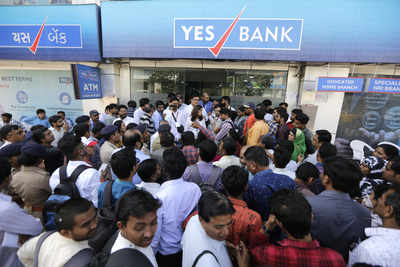
MUMBAI: The board of State Bank of India (SBI) on Thursday approved a proposal to invest Rs 7,250 crore in Yes Bank by purchasing 725 crore shares. The approval is subject to the condition that the public-sector lender's holding will remain within 49% of the paid-up capital of Yes Bank.
While the amount is higher than the Rs 2,450 crore indicated earlier in the RBI's draft plan, it is lower than the Rs 10,000 crore that SBI chairman Rajnish Kumar had said that the bank was willing to infuse in the troubled private lender.
Also, if the purchase of 725 crore shares is intended to help SBI acquire a 49% stake, the total capital-raising is unlikely to be more than Rs 15,000 crore. The paid-up capital could go higher than Rs 15,000 crore if SBI allows its stake to fall below 49% and other investors - including private banks - pick up a stake of at least 35%.
Given that the private lender's authorised capital has been raised to Rs 5,000 crore by the RBI, Yes Bank can raise an additional Rs 10,000 crore even after SBI's Rs 7,250-crore investment. Of this, there is a likelihood that Rs 1,750 crore could come from the conversion of additional tier-1 bonds with investors agreeing to the conversion.
In its reconstruction scheme for Yes Bank, the RBI said that the investor would need to invest in the equity of the reconstructed bank to the extent that post-infusion it holds 49% at a price of not less than Rs 10 per share of Rs 2.
Shares of Yes Bank, which were on the upswing after RBI's reconstruction plan, slipped 13% on Thursday in line with the global market collapse. Shares of the private lender closed at Rs 25, which values the bank at Rs 6,389 crore - more than twice RBI's valuation of the private lender under its reconstruction scheme.
Besides SBI, private lenders including HDFC group, ICICI Bank group, Kotak Group and private investors like Rakesh Jhunjhunwala and R K Damani are expected to participate.
Meanwhile, India Ratings in a report said that the delays in resuming normal services could impact the near-term liquidity of some of the bank's customers. Also, corporate groups with a large dependency on the bank could face a longer period of disruption.
"These disruptions could stem from their usage of Yes Bank as a lender for facilities such as cash credit, letters of credit (LCs), bank guarantees (BGs) and other working capital facilities as well as a term debt provider. The moratorium is also likely to impact the liquidity cushion available with many corporates in form of deposits and investments parked with Yes Bank," India Ratings said.
While the amount is higher than the Rs 2,450 crore indicated earlier in the RBI's draft plan, it is lower than the Rs 10,000 crore that SBI chairman Rajnish Kumar had said that the bank was willing to infuse in the troubled private lender.
Also, if the purchase of 725 crore shares is intended to help SBI acquire a 49% stake, the total capital-raising is unlikely to be more than Rs 15,000 crore. The paid-up capital could go higher than Rs 15,000 crore if SBI allows its stake to fall below 49% and other investors - including private banks - pick up a stake of at least 35%.
Given that the private lender's authorised capital has been raised to Rs 5,000 crore by the RBI, Yes Bank can raise an additional Rs 10,000 crore even after SBI's Rs 7,250-crore investment. Of this, there is a likelihood that Rs 1,750 crore could come from the conversion of additional tier-1 bonds with investors agreeing to the conversion.
In its reconstruction scheme for Yes Bank, the RBI said that the investor would need to invest in the equity of the reconstructed bank to the extent that post-infusion it holds 49% at a price of not less than Rs 10 per share of Rs 2.
Shares of Yes Bank, which were on the upswing after RBI's reconstruction plan, slipped 13% on Thursday in line with the global market collapse. Shares of the private lender closed at Rs 25, which values the bank at Rs 6,389 crore - more than twice RBI's valuation of the private lender under its reconstruction scheme.
Besides SBI, private lenders including HDFC group, ICICI Bank group, Kotak Group and private investors like Rakesh Jhunjhunwala and R K Damani are expected to participate.
Meanwhile, India Ratings in a report said that the delays in resuming normal services could impact the near-term liquidity of some of the bank's customers. Also, corporate groups with a large dependency on the bank could face a longer period of disruption.
"These disruptions could stem from their usage of Yes Bank as a lender for facilities such as cash credit, letters of credit (LCs), bank guarantees (BGs) and other working capital facilities as well as a term debt provider. The moratorium is also likely to impact the liquidity cushion available with many corporates in form of deposits and investments parked with Yes Bank," India Ratings said.
Download The Times of India News App for Latest Business News.
more from times of india business
Coronavirus outbreak
Business News
LATEST VIDEOS
More from TOI
Navbharat Times
Featured Today in Travel
Quick Links
ELSS Mutual Funds BenefitsIncome Tax Refund statusWhat is AssochamITR Filing Last DateHome Loan EMI TipsHome Loan Repayment TipsPradhan Mantri Awas YojanaTop UP Loan FeaturesIncrease Home Loan EligibilityHome Loan on PFTax Saving Fixed DepositLink Aadhaar with ITRAtal Pension YojanaNita AmbaniIndian EconomyRBIAadhaar CardSBIReliance CommunicationsMukesh AmbaniIndian Bank Ifsc codeIDBI Ifsc codeIndusind ifsc codeYes Bank Ifsc CodeVijay Bank Ifsc codeSyndicate bank Ifsc CodePNB Ifsc codeOBC Ifsc codeKarur vysya bank ifscIOB Ifsc codeICICI Ifsc codeHDFC Bank ifsc codeCanara Bank Ifsc codeBank of baroda ifscBank of America IFSC CodeBOM IFSC CodeAndhra Bank IFSC CodeAxis Bank Ifsc CodeSBI IFSC CodeGST
Get the app







